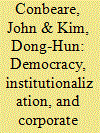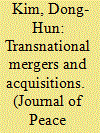|
|
|
Sort Order |
|
|
|
Items / Page
|
|
|
|
|
|
|
| Srl | Item |
| 1 |
ID:
100284


|
|
|
|
|
| Publication |
2010.
|
| Summary/Abstract |
The authors bring together and extend three strands of existing research: the propensity of democracies to ally with each other, the effects of alliances being institutionalized, and the causal impact of democracy in promoting investment. This literature is applied to corporate alliances, predicting the probability that announced alliance contracts will be completed by the participants. The authors find that democratic political regimes generate rules that create corporate shareholder democracy and that the latter promotes the institutionalization of corporate alliances. Corporate democracy and alliance institutionalization will both, controlling for transaction costs, increase the probability that corporate alliances will be completed. The findings suggest a positive association among democratic corporate governance, the willingness of corporate alliance partners to accept institutionalized ties, and the creation of an environment conducive to commercial investment commitments through alliances. Overall, corporations appear to respond to some of the same alliance incentives as sovereign states.
|
|
|
|
|
|
|
|
|
|
|
|
|
|
|
|
| 2 |
ID:
101690


|
|
|
|
|
| Publication |
2010.
|
| Summary/Abstract |
While globalization advocates have argued that market liberalization and economic integration will strengthen human rights by promoting economic development and facilitating the diffusion of rights-supportive norms and values, critics contend that the same processes threaten to undermine human rights through economic exploitation and the repressive actions of pro-growth governments. To contribute to this debate, the authors examine the relationship between one aspect of economic globalization, foreign direct investment, and human rights performance. But the authors go beyond existing studies of the human rights impact of foreign direct investment, which generally lump all forms of FDI into a single aggregate indicator, by focusing on one specific form of FDI, transnational mergers and acquisitions (M&As). This is a particularly important area to explore given the human rights literature's emphasis on multinational corporations as both potential violators of human rights and catalysts for improvements in human rights performance. This study examines the impact of cross-border M&As, which have become an increasingly prominent form of foreign direct investment over the last 25 years, on human rights performance globally from 1981 through 2006. The results of the statistical analysis show that transnational mergers and acquisitions have a positive impact on human rights conditions across several indicators, including physical integrity rights, empowerment rights, workers' rights, and women's economic rights. This positive impact of cross-border M&As is particularly pronounced in developing countries.
|
|
|
|
|
|
|
|
|
|
|
|
|
|
|
|
|
|
|
|
|